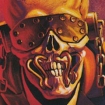As unexpectedly rocky as 2016 was for many of us, the year did serve up some pleasant surprises—and The Stage, Avenged Sevenfold's seventh studio album, was unquestionably one of them.
Not only did the band suddenly drop the album at the end of October without any real advance promotion, but The Stage also turned out to be the most ambitious Avenged album yet. Instead of the straightforward hard rock songs that characterized 2013's Hail to the King, The Stage presented listeners with a deeply complex concept album about the evolution of artificial intelligence and its possible consequences (both positive and negative) upon our society.
Co-produced by the band with Joe Barresi (Tool, Melvins, Queens of the Stone Age), The Stage's 11 tracks found the band stretching their songwriting and musicianship in all sorts of challenging directions. Several of the tracks feature orchestral instruments and arrangements, and the album culminates in "Exist," a near 16-minute progressive-metal rendering of the Big Bang and the subsequent creation of Earth and its denizens, which goes even further over the top by including a spoken-word cameo by Neil deGrasse Tyson, director of the Hayden Planetarium in New York City.
Though The Stage was widely hailed as a masterpiece by the U.S. metal press— and though it shot to No. 4 on the Billboard charts in its first week of release, selling over 76,000 units despite the lack of any promotional fanfare—the album's surprise release ultimately proved more controversial within the music industry (and among the band's fans) than its ambitious contents. Two months after the album's release, Revolver caught up with the California-based metal group's frontman M. Shadows for an intense conversation regarding the band's (which also includes guitarists Zacky Vengeance and Synyster Gates, bassist Johnny Christ and new drummer Brooks Wackerman) daring release strategy and the challenges that it entailed, as well as its potential impact upon other metal bands. We also talked about the "new vibe" of A7X's 2017 tour, the possible future ramifications of A.I. on musical creativity, and the band's desire to party with Neil deGrasse Tyson himself.
REVOLVER Pop and rock artists like Beyoncé and Radiohead have done surprise album releases in recent years, but Avenged Sevenfold is the first metal band to try something like this. Why did you decide to drop The Stage this way?
M. SHADOWS I think it came down to being off for two and a half years, and sitting at home and watching what other people were doing. And I hate throwing other bands under the bus, but with a lot of bands I would get excited by the announcement that a new record was coming—but then there would be teaser after teaser after teaser after teaser, and there would be three or four singles before the album came out. It just became one of these things that we didn't want to do. We were like, "Well, we're going into the studio, but we don't really want to put up an Instagram pic, because what does that really do for us?" All it does is get a bunch of people hyped up about that you're in the studio, and saying things like, "Look at the guitar they're using—it must be a thrash record!" And then that takes off in the press, and all of these things get so blown out of proportion…
Eventually, we got so far down the line with the record that we were like, "Let's just put this thing out as a surprise!" It was exciting to us; you had five guys who were actually excited about releasing a record, instead of dreading [having to do] all the advance press and everything that comes with a record release. It's not that we didn't want to do the work—it's that you get asked a bunch of questions by a bunch of guys that have never heard the record. "Is it fast? Is it melodic? Is it heavy? Are you screaming?" I feel like it's been easier to let people hear it first and form their own opinions on it, and then talk to them about it.
This is your first release with Capitol Records. How did you convince them to let you do a surprise release?
We had recorded the album without being signed to anybody; we funded the record ourselves, and if someone didn't come to the table with an offer that we felt comfortable with, we were going to put the record out ourselves. So all those things were already in the works—we were looking to get distribution, and preparing to release this thing independently on our own record label. So when we went to Capitol, we walked in there with a lot of swagger and power. We weren't walking in there like a meek band, saying, "Please give us the schedule and get us all the press!" And I think everyone got on board, at least after the initial shock of, "Hey, thanks for signing us—here's the record, and now we want to release it randomly!"
Still, we didn't know if metal audiences would even be ready for something like this. Metal audiences like their black shirts with the skulls on 'em, they like going to rock shows, and they like getting their music a certain way. But we don't want to be pigeonholed like that. So we explained that to the label, and they were very cool about it.
You timed the album's release to coincide with your live-streamed, in 3D / 360-degree virtual reality, performance from the top of the Capitol Building in Hollywood. Were you at all worried that the album would be leaked beforehand?
We completely realized that, if the records were going to go into stores ahead of our Capitol performance, there was a risk of it being leaked. I just said to the label, "With all due respect, I don't care if it leaks. Who cares if 10,000 people download it for free right before it comes out? As long as people are liking it, and the impact is still the same." If it's going to leak, it's not the end of the world. If a guy puts it on the Internet and everyone wants to steal it, that's just the world we're in, and complaining about it doesn't get you anywhere. So, Capitol did a great job of getting the record into the stores while keeping it a secret, but it was a huge undertaking for them!
The record did leak shortly before the release, correct?
Yeah, it leaked a day before. We actually thought it was going to leak on Sunday, and it didn't leak until that Wednesday evening—and the show on the Capitol Building was Thursday night, and iTunes was launching it Thursday night, so it was no big deal. And who knows if those people would have even bought it, anyway
Overall, did the surprise release go off as you'd hoped?
I thought it was awesome. I thought it was exciting, and the people that got it and were engaged were really appreciative of it. Yeah, it was great!
How has the reaction been from your fans?
It's actually been really weird. A lot of people are like, "Is it a real record? Then why didn't I hear about it? If I didn't hear about it, it must suck!" I think we were blindsided by that a little bit—that if you're doing something new and different, people think you're "up to something," or trying to hide something. I think we've run into more barriers being part of the rock and metal scene than what we anticipated; if Radiohead does this, they don't really get that kind of backlash. Only in our scene do you get that stuff.
Do you think that other metal bands will take a page from your playbook in the future, and drop their albums in a similar "surprise" fashion? And, would you guys take the same approach again?
I don't know that we'd do the same approach, but I'd like to do something else interesting. And I don't know if other metal bands will take the same approach; I don't like to complain about this, because it's really not an important part of my life, but it seems like the metal media has done as much as it can to try to blunt this thing, especially in the U.K. We've actually had magazines and radio stations in the U.K. that won't work with us because of it—they said that we had "a blatant disrespect for print magazines," because the way we did this didn't give them proper time to put out covers and reviews. We had radio people telling us they weren't going to play the song we gave them, because they weren't "in the know" about this.
There are all these people that act like they're on your side, but they're really just these little gatekeepers who push back when you try to do something different. I get it, but as artists, we're not going to look at all these magazines and radio stations and say, "What's best for them?" That's exactly what people don't want; they want artists to do artist things, write the music they're going to write, and do what they want to do. But if people are going to act like that, that makes things a lot harder. As big as this band is, it's not really going to affect us; looking at the European ticket sales, it obviously hasn't affected us. But at the same time, jeez, I feel bad for any band coming up that could just get crushed by this stuff.
Speaking of shows, you guys have mentioned working with the company behind Cirque du Soleil's theater productions. What will the stage show be like for this next 2017 tour?
It's not going to be a pyro-heavy, 1980s-style show from Avenged Sevenfold—there's a whole new vibe to this thing. We're going in more of an organic outer-space type route, trying to really bring people into the world and the artwork of The Stage, even though we're going to be playing old songs as well. We're trying to really make everything work together, and make a really cohesive show, as much as you can do with songs that come from different albums and different eras.
So it's not going to be Avenged vs. the Giant Robots, or something corny like that?
No. [Laughs] I look at it more like, if you've ever been to the Hayden Planetarium in New York, Neil deGrasse Tyson does a thing where you sit in a chair and they take you into deep outer-space. We saw that and we were like, "We want to do this!" If we can take people into our world for two hours, that would be pretty damn cool.
Speaking of which, have you guys partied with Tyson yet?
No, we haven't partied with Neil—but if he's down to party, I think we'd definitely be down to party with him [laughs]! We're kind of letting him be right now and not bugging him about it, but I know he's been getting a lot of tweets from people reaching out to him about the song, which is cool. It would be fun to do something with him live, like have him come out and do the song with us at a big show. Who knows? I think there are a lot of possibilities.
Some of The Stage's lyrics have to do with artificial intelligence. Do you have any thoughts about what artificial intelligence might mean for the future of music?
Oh man, I've never thought of that! I guess that's part of the whole question of, "Why are humans different?" We create symphonies, we create art, we do things that our predecessors, the monkeys and the apes, couldn't do. We have this thing that we call consciousness, and we have this creative urge in us, and that's kind of what make us special. You have to wonder—if we actually got to the point to where A.I. was making music, would that intrigue humans? Would it make the perfect notes and perfect songs?
Well, musicians always talk about having trouble translating the sounds and melodies in their heads to tape—could A.I. be a creative tool, in that regard?
Yeah, that's a really interesting idea. There are so many things that are swimming around in your brain—could this somehow be the bridge that puts it into something where we can all listen to it? You've gotta think that that's gotta be right around the corner, you know? I don't see why not. It just depends on the amount of technology that people put into things like that, right off the bat. People usually take technology and use it for other things before they use it for music—creativity is probably the last thing on scientists' list of priorities [laughs].












